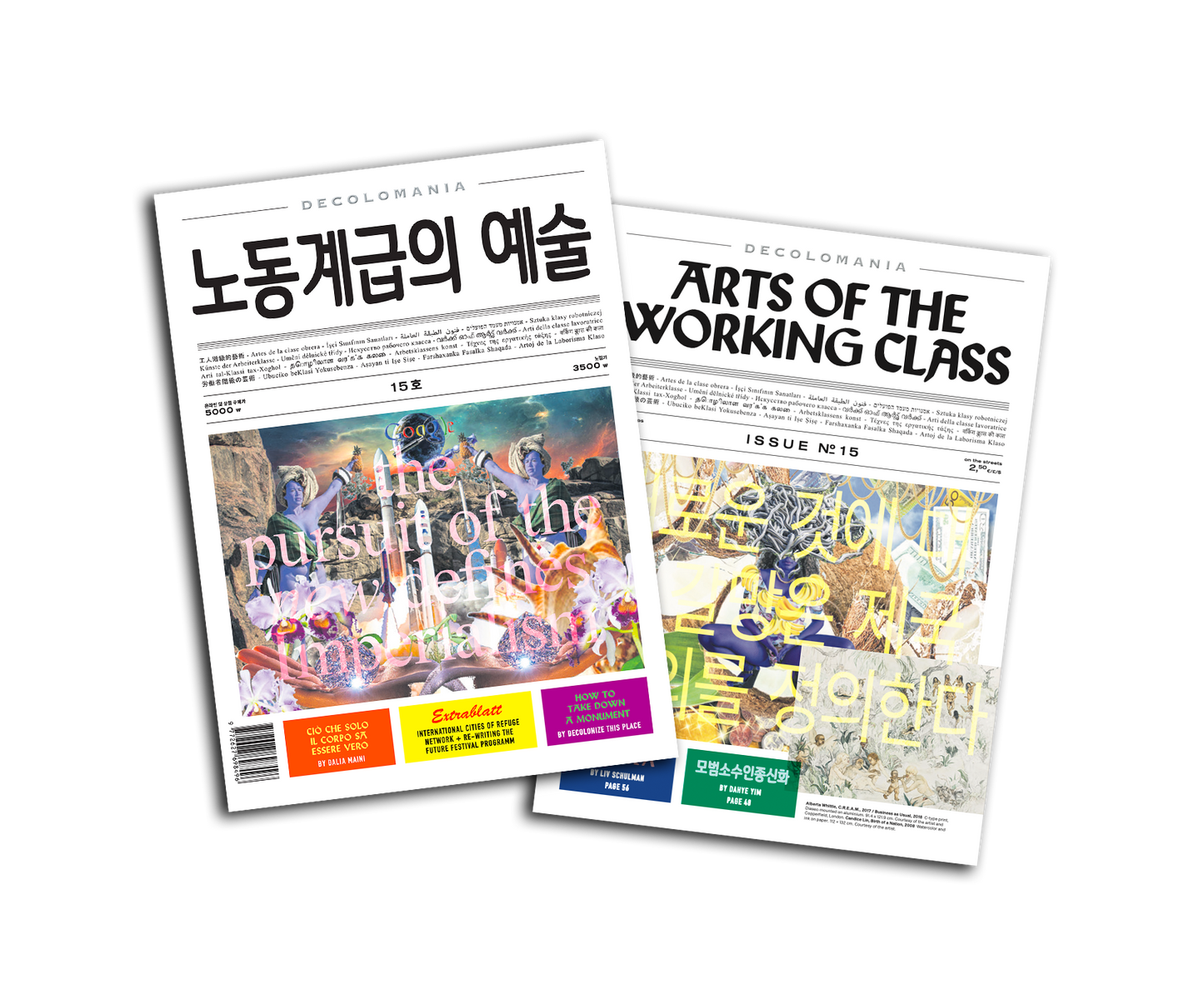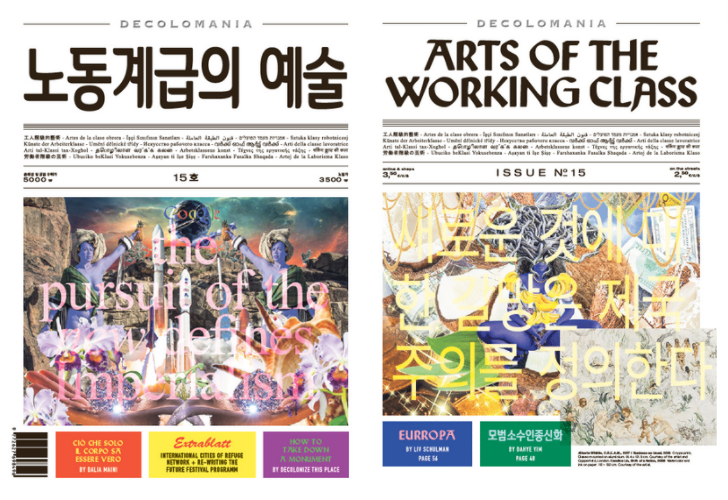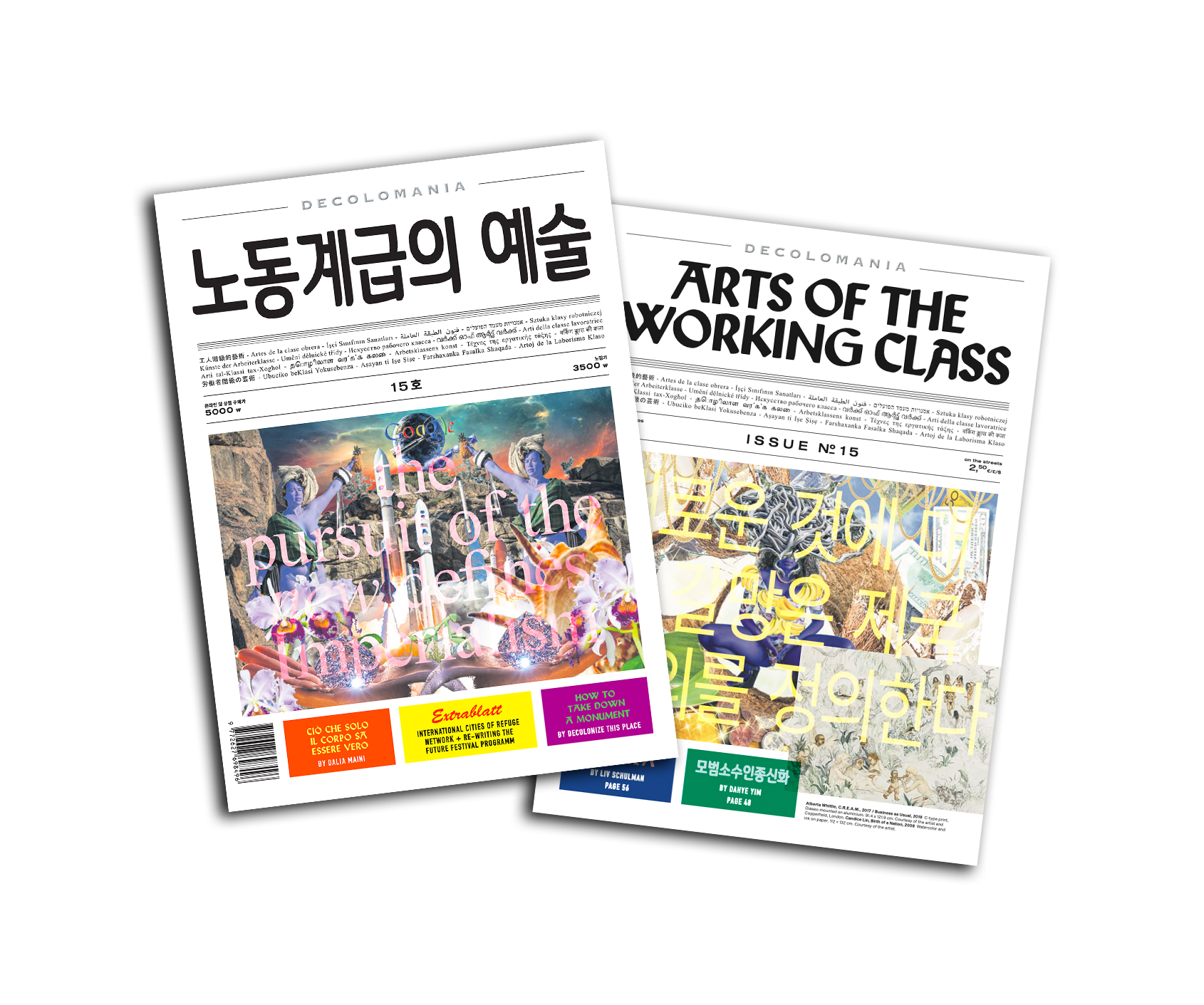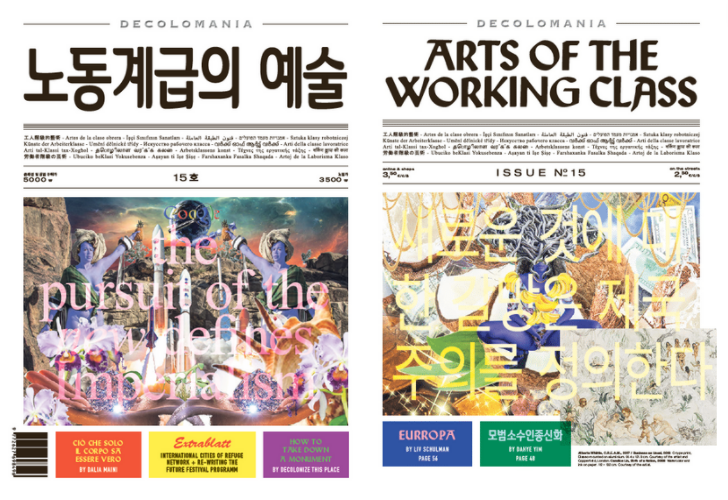Arts of the Working Class
ISSUE 15: Decolomania
ISSUE 15: Decolomania
Couldn't load pickup availability
The only thing we can decolonize is the future. In order to achieve this, we need to understand the past and change our very present. We start the year of the Ox, the second pandemic year, with Decolomania; an issue on art history, the history of politics, and the history of theory: all of them colonized and colonizing, much like our very selves. It is framed by reviews of books as a format that allows for new perspectives to be drawn, and a form of understanding and shaping a worldview, to get history moving again, evolving away from Eurocentrism.
유일하게 우리가 탈식민지화 할 수 있는 것은 미래이다. 미래를 탈식민지화하기 위해서 우리는 과거와 미래를 변화시켜야한다. 신축년의 해와 팬데믹이 지배한 두번째 해를 우리 자신처럼 식민화 되었고 지금도 식민화되고 있는 미술사, 정치사 그리고 이론사를 다루는 이번호, “Decolomania”로 맞이한다. 이번호는 여러 책의 리뷰를 통해 유럽 중심주의로부터 멀어질 수 있는 새로운 관점, 세상에 대한 시선과 이해를 형성할 수 있는 가능성을 열고자 한다.
“THE PURSUIT OF THE NEW DEFINES IMPERIALISM”
“새로움을 추구하는 것이 제국주의를 정의한다”
Paraphrasing the author Ariella Aïsha Azoulay, the headline of Decolomania maintains what decolonial theorists recognized as the dislocation between the colonial version of
the world and the concrete historical experience of the colonized. Marx's heritage of "historical materialism", directed in the 20th century by the control of the nation-state, lies in opposition to the historical experiences that since the 1960s have demanded the "democratic self-reproduction of the society". Today we must deal with the obstacles that impede the formation of a strong alternative imaginary.
Ariella Aïsha Azoulay 작가의 말을 바꾸어 씀으로써 Decolomani라는 이번호의 제목은 탈식민지 이론가들이 인식한 식민화된 세상과 식민지배를 당한 당사자들의 견고한 역사적 경험 사이의 단절을 말하고자 한다. 20 세기에 민족 국가의 통제에 의해 지시된 마르크스의 "역사적 유물론"의 유산은 1960년대 이후 "사회의 민주적 자기 재생산"을 요구해온 역사적 경험에 반대하는 것이다. 오늘날 우리는 강력한 대안적 상상을 방해하는 요소들을 해결해야 한다.
Living in a grim present, leaving our imagined futures little light at the end of the tunnel, for the third year of Arts of the Working Class’ existence, we chose an overarching theme that will run through all issues of 2021: folk tales, Volksgeschichten, cuentos criollos, wieści ludowe. From conspiracy theories to identitarian or nationalist fantasies to planetary mythologies and – hopefully – narratives that do not amount to isolation and civil feud, we want to find a place in the differences. For human relationships and solidarity in the future, Decolomania is the start of our journey through 2021. Through these narratives that Arts of the Working Class hosts over the next twelve months, we will get closer to tactics of proximity and forms of conviviality, but will also unveil their manipulative power in favor of destructive economic and political systems.
우리가 상상한 미래를 아주 적은 빛이 있는 터널 끝에 놓은 암울한 현재에 살면서, Arts of the Working Class (노동계급의 예술)은 3주년을 맞이하여 2021년의 모든 이슈를 다룰 수 있는 주제로 민간설화, Volksgeschichten , cuentos criollos, wieści ludowe를 선택했다. 음모론에서 정체성주의(identitarian), 민족주의적 판타지에서 자연에 대한 신화 그리고 바라건대 고립과 시민적 불화에 해당하지 않는 내러티브에 이르기까지- 그 차이에서 우리의 자리를 찾고자합니다. 미래의 사람간의 관계와 연대를 위해, Decolomania는 2021을 항해하는 출발점이 될 것이다. 올 한해 Arts of the Working Class (노동계급의 예술)이 전하는 내러티브를 통해 우리는 서로 가까워지는 방법과 유쾌한 모습에 근접해 질 것이며, 파괴적인 경제 및 정치 시스템에 유리하게 그들이 조작하는 힘에 대해서도 밝힐 것이다.
We are currently experiencing an epistemological transformation: Our perception is narrowed by ceaseless exposure to the very devices that should revolutionize our communication. Those in solidarity with the doctrine of consumption impose the incessant flux of the “new”, promoting social homologation rooted in a collective amnesia. What we can negotiate and are ready to rehearse this year is the space of friction and connection between more diverse realities. When looking out for the potentials of narratives to organize our society, especially in the arts, the collective vista must ground and understand the struggle of others as the struggle of oneself. We wish you a sweet new lunar cycle.
우리는 현재 인식론적 변화를 경험하고 있습니다. 다시 말해, 커뮤니케이션에 혁명을 가져와야하는 장치들에 끊임없이 노출 됨으로써 우리의 인식은 좁아졌다. 소비주의적 원칙에 연대하는 사람들은 끊임없이 "새로운 것"을 유입함으로써 집단적 기억상실에 뿌리를 둔 사회적 동질화를 촉진한다. 우리가 올해 협의하고, 연습할 준비가 되어있는 것은 마찰의 공간과 다양한 현실간의 연결이다. 우리 사회 - 특히 예술 분야- 를 만들어가는 잠재적 내러티브를 찾아나설 때, 집단적 전망이 토대가 되고 다른 이들의 투쟁을 나의 것으로 여겨야 한다.
새해 복 많이 받으세요.
Arts of the Working Class (노동계급의 예술) 드림
With the contributions from John Holten, Mohammad Salemy, Clara Pacquet, Pierre D’Alancaisez, Agata Pyzik, Chris Paxton, Zairong Xiang, Jéssica Zambrano Alvarado, Fette Sans, Will Furtado, Dalia Maini, Marina Gržinić and Tjaša Kancler, Elisa Fuenzalida, María Inés Plaza Lazo, Sebastjan Brank, Dahye Yim, Lo-Tek, Jean-Marie Dhur & Lisa Pieper, Matylda Krzykowski, Kaya Haslinger, A.R. practice (Agnieszka Roguski & Ann Richter), Ira Konyukhova & Bermet Borubaeva, Maja Demska, Alberta Whittle, Liv Schulman, Mariana Castillo Deball, Leandro Pesantes, Sophie Utikal, Sung Tieu
PUBLISHING ADDRESS / VERLAGSADRESSE:
Reflektor Monde gUG (haftungsbeschränkt), Lynarstrasse 38, 13353 Berlin
Vertreten durch die Geschäftsführer:
Alina Kolar, María Inés Plaza Lazo & Pauł Sochacki
Managing Editors: Dalia Maini, Sebastjan Brank
Art Direction/Layout: Hans Löffler
Coordination & Distribution: Chris Paxton, Mohammad Al-Hasani
Interns / Praktikant*innen: Faye Campbell, Kaya Haslinger
Druck: Druckzentrum Osnabrück GmbH & Co. KG, Osnabrück, DE
Alle Vertriebs und Kundenanfragen an:
Arts of the Working Class, Lynarstraße 38, 13353 Berlin, DE /
E-mail: hey@artsoftheworkingclass.org /
Tel: +49 1716292064




